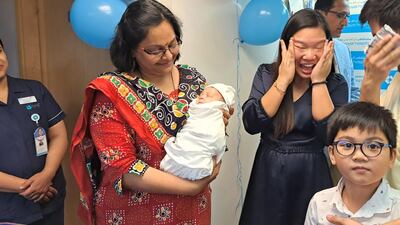After the most difficult start in life, Zedrick Madoginog recently left hospital in Sharjah after being born four months early and weighing only 500 grams.
His remarkable resilience is being celebrated as a minor miracle by doctors – and his parents – who did not expect the newborn to survive owing to his extremely premature birth.
Zedrick was resuscitated at birth, spent six weeks on a ventilator, battled infections and had laser surgery in his eyes. But now the youngster can look forward to a brighter future after going home with his parents, weighing a mighty 2.035kg.
NMC Royal Hospital, Sharjah
"It will be a journey I will never forget,” said Zedrick's mother, Maricel Madoginog, 35, from the Philippines, who works for Dubai Ambulance Service, as does her husband Keith, 36.
“It brings tears to my eyes each time I recount the indefinite wait, unpredictable future, finding renewed strength, and valuing every passing moment that I saw my son breathe and fight to stay alive.
“It was a rollercoaster ride of a series of intubations and extubations.”
Dangerous infection
An intrauterine infection usually occurs when foetal membranes – the placenta or amniotic fluid that protects the unborn baby – become infected.
It can pose a serious risk to the mother and baby if left untreated and is a result of bacteria entering the tissue around the foetus.
Symptoms include fever, cervical discharge and can lead to an increased heart rate in both mother and baby.
It is usually treated with antibiotics but in serious cases can lead to brain damage or neurological problems in the mother.
Tests on the baby’s septic markers were significantly elevated and the first blood culture grew group B streptococcus bacteria, confirming the infection.

“Coincidentally, in this case, the exact gestation of the baby was uncertain due to the irregularity of the mother's menstrual cycle, making it difficult to determine the exact gestational age,” said Dr Mais Ibrahim, a specialist obstetrician and gynaecologist at the hospital.
“Based on the baby's support and clinical course requirements, it aligns with that of a 23-week-old.
"We had the option of transferring the baby to a local foundation, but thankfully our neonatologist accepted him.
“We wanted to give the baby a chance with us.
“The baby’s journey here has been a team effort and I have been following his progress very closely.
“The baby’s parents are very kind and lovely people. They deserve every happiness that has come their way.”
When Zedrick was born, his weight was comparable to a loaf of bread, or a hardback book.
Brought back to life
The baby was born without a heart rate and was not breathing, with an intact amniotic bag adding to the complexity of the situation.
The bag was punctured so medics could begin resuscitation attempts on the boy, before administering cardiac medication to kick-start his tiny heart into life.
Doctors then monitored any signs of cerebral palsy, a common condition in newborns starved of oxygen at birth.

Thankfully, Zedrick is showing promising signs that he will grow into a healthy baby, with his past three neurosonograms revealing no abnormalities, raising hopes for a normal growth and development trajectory.
“Due to his extreme prematurity and low weight, Zedrick relied on a ventilator for a gruelling six weeks,” said Dr Pooja Agrawal, a specialist neonatologist at the hospital.
“Throughout this challenging period, he faced infections and anaemia head-on, yet his tiny body fought back with extraordinary resilience.”
As his condition gradually improved, Zedrick underwent a delicate laser procedure on his eyes, undertaken to safeguard his sight.
The more premature the baby is, the lower the chances of survival, with very few infants born at 22 to 23 weeks of pregnancy surviving.
"When the baby was born, we prayed, because survival rates are poor at this stage of gestation – we didn’t know what the outcome would be,” Dr Agrawal said.
“Generally, babies in this condition are lost and we were praying that this baby would get better.
“Despite the ambiguity of the exact gestational age, he was the lowest weight baby ever discharged from our NMC Royal Hospital in Sharjah.
“It was a heartfelt moment of joy for all the team members who were there from the moment he was born.
“Zedrick has made his parents happy and given us hope too."


